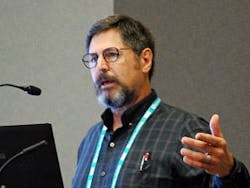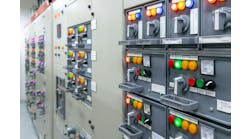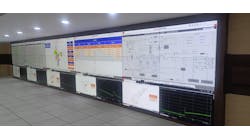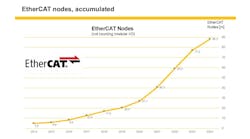"Five years ago, we had fewer than 30 engineers under the age of 30 years, or 0.05%," he said. "Now, our average age is 46, and we have more than 250 engineers under 30 years, or 35%.” Dale Nicosia of Savannah River Nuclear Solutions explained how the organization increased the retention rate of young engineers from 40% to 95%.
Brain drains due to rampant retirements are among the most vexing problems facing the process industries, and few practical remedies have been identified or implemented so far.Because this worsening manpower shortage has been especially severe among the staff at Savannah River Nuclear Solutions and all the nuclear processing facilities at its huge site near Aiken, S.C., it recently developed its Engineering Leadership Development Program (ELDP) to improve recruiting and retention of new engineers. The program has been a resounding success, and contains lessons for others coping with their own brain drains.
"We do everything from having a mobile group that can go and secure nuclear material anywhere worldwide to making Plutonium-238 for powering NASA's deep space probes, so we must maintain a highly skilled technical workforce," said Dale Nicosia, tritium process automation manager, Tritium Process Control and Automation, Savannah River Nuclear Solutions. "At the same time, we have accelerating numbers of Baby Boomers retiring, as well as legacy recruiting and onboarding processes, low job acceptance and retention, and the challenge of being located in rural South Carolina."
Nicosia presented "A Workforce Success Story—Retirement Impacts and Quest to Attract and Retain Technical Talent" this week at the Emerson Global Users Exchange in San Antonio, Texas.
More Work, Few Incentives
In 2010, Savannah River's technical workforce consisted of more than 600 engineers across a range of disciplines, supporting numerous facilities scattered over its 310-square-mile location. Beyond their academic educations, these engineers undergo extensive qualification programs driven by U.S. Dept. of Energy, and must also achieve security certifications and clearances to do their jobs. These requirements make it difficult to fill positions quickly, and chronic federal budgeting and funding shortfalls make it even harder to plan how to counteract these problems, according to Nicosia.
"We also had a lot of human resources inefficiencies, and an HR department that was understaffed and unable to keep up. There was no strategic staffing forecast, and so we couldn't look at what was needed next month or next year," said Nicosia. "We did a lot of local recruiting among families, friends and nearby universities, but technical managers weren't sent out, and HR couldn't answer the detailed questions of many candidates, which was a bad problem. We didn't even have useful brochures."
Even when Savannah River could hire new engineers, they often received a day-and-a-half, firehose-style orientation before being sent into the field. Or, because their security clearances might take a year or more, they'd be assigned to temporary jobs that were uninteresting and quit soon after.
"There was limited exposure to our mission, goals and procedures, and we were lacking peer interactions among new engineers," added Nicosia. "When you're 22-24 years old and just out of college, it's hard to relate if all your colleagues are in their 50s. Legacy training and mentoring programs were disjointed and inconsistent. Some were good, and some were not. We also weren't directing our new engineers to the technical, leadership, pure engineering or operations paths they might want to pursue.
Five years ago, the average age of Savannah River's engineers was 55 years old, while its retention rate in 2010 was just 40%, and sometimes less in prior years. "Our technical workforce was shrinking, even as our overall work scope was growing," said Nicosia.
Pipeline to leadership development
To respond and begin resolving its workforce crisis, Nicosia reported that Savannah River's engineering management and HR department launched an engineering hiring pipeline pilot program in 2012. It started strategic personnel forecasting and hiring, and focused on keeping newly hired engineers together in a peer group in one building, where they receive orientation, training, mentorship, tours, sample projects and exposure to tools before assignment to facilities.
"We began looking at staffing needed now, next month and next year, and institutionalized the pilot as our ELDP solution by keeping the best parts of our pipeline project," said Nicosia. "ELDP consists of a 3.5-month program that allows newly hired college graduates to learn about the site, and experience various challenging opportunities within SRNS Engineering. They even get involved in our recruiting, interviewing, onboarding, training, mentoring, networking and engineer placement programs."
In addition, ELDP participants: set expectations for career paths and progression; attend and present at safety meetings; support place to work initiatives; network with senior management via programs like Engineering Week, safety expos, Leaders Emerging Among Professionals (LEAP) and community involvement. Plus, ELDP initiates their security clearances and qualifications at the beginning of the program, which gets them approved for facility placement much sooner than previously.
"This lets our new engineers get to know the site, and learn about different job assignments available," added Nicosia. "At the same time, facility management gets to know the capabilities of each new engineer before assignment. ELDP also gives our new engineers the chance to be around other college graduates at the same time in the careers, network with engineers in other disciplines, and make friends and contacts that can last throughout their careers."
Successful, sustainable staffing
Nicosia reported that ELDP has been extremely successful, with the retention rate for its participants increasing to 95% at present from the 40% for its new engineering hires in 2010. So far, 270 new engineers have completed ELDP. As a result, the average age of Savannah River's engineers has declined to 46 years at present.
"ELDSP is run by one dedicated engineering manager, two engineering assistants and two senior technical mentors," explained Nicosia. "The technical mentors are volunteers that rotate in for staggered six-month assignments, so there's always one that's experienced."
Nicosia added that ELDP has been enthusiastically received by candidates at career fairs, while campus recruiting by SRNS also involves its hiring manager and ELDP alumni. "We're also recruiting nationwide now, instead of just locally, and getting some top engineering talent.
"Five years ago, we had fewer than 30 engineers under the age of 30 years, or 0.05%," he said. "Now, our average age is 46, and we have more than 250 engineers under 30 years, or 35%.”
Nicosia added that the ELDP model for engineering leaders has been so successful that it was expanded this year into a Technical Leadership Development Program (TLDP) for two-year degree and certificate holders, such as electrical and mechanical technicians.
The editors of Control are on-site at the 2018 Emerson Global Users Exchange conference to bring you breaking news, innovations and insights from the event. Once it is over, the editors will put together an event report featuring the top news. Pre-order your copy of the report today.








